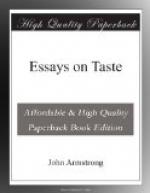Your sincere Friend, &c.
LETTER
TASTE:
AN
EPISTLE
TO A
YOUNG CRITIC.
Range from Tower-hill all London to the Fleet, Thence round the Temple, t’utmost Grosvenor-street: Take in your route both Gray’s and Lincoln’s Inn; Miss not, be sure, my Lords and Gentlemen; You’ll hardly raise, as I with[A] Petty guess, } 5 Above twelve thousand men of taste; unless } In desperate times a Connoisseur may pass. }
“A Connoisseur!
What’s that?” ’Tis hard to say:
But you must oft amidst the fair and gay
Have seen a wou’d-be rake, a fluttering
fool, 10
Who swears he loves the sex with all his
soul.
Alas, vain youth! dost thou admire sweet
Jones?
Thou be gallant without or blood or bones!
You’d split to hear th’ insipid
coxcomb cry
Ah charming Nanny! ’tis too much!
I die!— 15
Die and be d—n’d, says
one; but let me tell ye
I’ll pay the loss if ever rapture
kill ye.
[Footnote A: Sir William Petty, author of the Political Arithmetic.]
’Tis easy learnt the
art to talk by rote:
At Nando’s ’twill but cost
you half a groat;
The Redford school at three-pence is not
dear, Sir;
At White’s—the stars
instruct you for a tester. 21
But he, whom nature never meant to share
One spark of taste, will never catch it
there:—
Nor no where else; howe’er the booby
beau
Grows great with Pope, and Horace, and
Boileau.
Good native Taste, tho’
rude, is seldom wrong,
Be it in music, painting, or in song.
But this, as well as other faculties,
Improves with age and ripens by degrees.
I know, my dear; ’tis needless to
deny ’t, 30
You like Voiture, you think him wondrous
bright;
But seven years hence, your relish more
matur’d,
What now delights will hardly be endur’d.
The boy may live to taste Racine’s
fine charms,
Whom Lee’s bald orb or Rowe’s
dry rapture warms:
But he, enfranchis’d from his tutor’s
care, 36
Who places Butler near Cervantes’
chair;
Or with Erasmus can admit to vie
Brown of Squab-hall of merry memory;
Will die a Goth: and nod at [A]Woden’s
feast, 40
Th’ eternal winter long, on [B]Gregory’s
breast.




